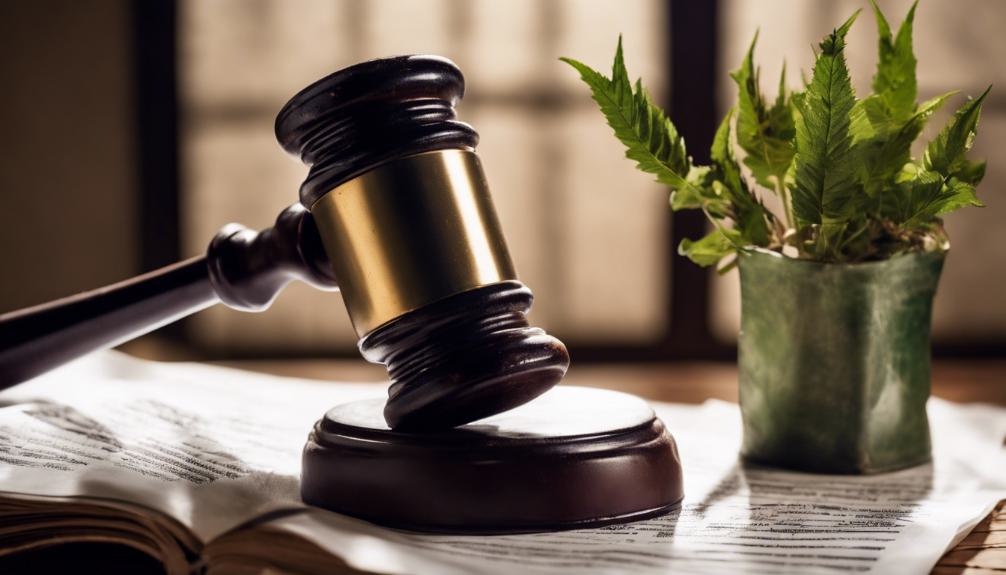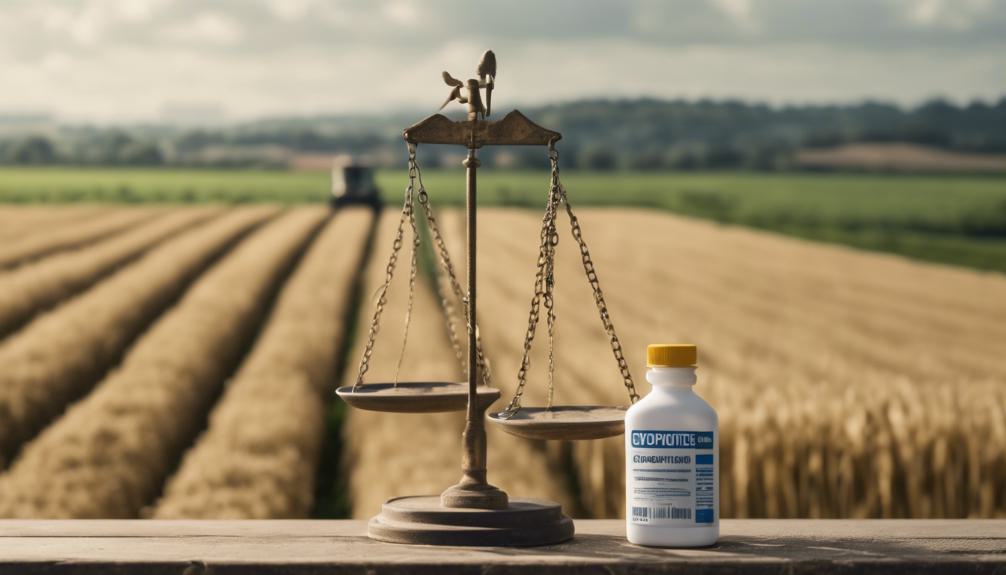Glyphosate Lawsuit
In recent years, we've seen a surge in legal actions against the makers of Roundup, attributed mostly to its active ingredient, glyphosate. Take, for example, the landmark case where a jury awarded millions to a plaintiff alleging that long-term exposure led to their cancer diagnosis. We're at a pivotal moment where the intertwining of legal battles, scientific research, and personal stories unfold, shedding light on the potential health impacts of glyphosate. As we examine the plaintiffs' narratives and regulatory responses, one can't help but wonder about the broader implications for public health and environmental safety. What will this mean for future regulations and those affected?

The Science of Glyphosate

Glyphosate, a widely-used herbicide, has sparked controversy due to its potential health risks. We've delved into extensive research to understand its scientific implications and how it interacts with our environment and health. At its core, glyphosate targets an enzyme pathway essential for plant growth, which is why it's so effective as a weed killer. However, the crux of the debate lies in its safety for humans and animals who are exposed to it, either directly or through consumption of treated crops.
Studies have presented conflicting results. Some research suggests that glyphosate poses a minimal risk to human health when used as directed. These studies argue that the herbicide does not accumulate significantly in the human body and is broken down quickly by sunlight and soil bacteria, minimizing its environmental impact. On the flip side, we've encountered research that raises concerns about its carcinogenic potential, with some studies linking glyphosate exposure to an increased risk of certain types of cancer.
Amidst this scientific tug-of-war, we're caught trying to balance the benefits of glyphosate's agricultural efficiency with the imperative to protect public health. It's a complex issue that requires us to weigh the evidence carefully and consider the broader implications of glyphosate use.
Legal Battles Unfold

As we've explored the scientific debates around glyphosate, it's clear that the controversy has also paved the way for numerous legal challenges. Courts across the globe have become battlegrounds where plaintiffs allege that exposure to glyphosate-based herbicides, like Roundup, has resulted in various health issues. These legal battles have not only sparked public interest but have also led to significant financial settlements and verdicts.
In the U.S., thousands of lawsuits have been consolidated into multidistrict litigation, highlighting the scale of concern and the breadth of the claims. These cases have drawn attention to the regulatory oversight and safety assessments conducted by agencies, questioning whether they've adequately protected public health.
As we navigate through these legal waters, it's evident that the outcomes of these cases have broader implications. They're not just about compensatory damages; they're about forcing a reevaluation of the processes by which agricultural chemicals are approved and monitored. The legal proceedings have also ignited a broader conversation about corporate responsibility and the need for transparency in the studies underpinning regulatory approvals. Through these legal battles, we're witnessing a pivotal moment in the discourse on environmental health and safety regulations.
Health Impacts Examined

We're delving into the heart of the matter, examining how exposure to glyphosate-based herbicides impacts health. There's a growing body of research suggesting that long-term exposure can lead to serious health issues. It's crucial we understand these risks to better protect ourselves and our communities.
Studies have shown that glyphosate, the active ingredient in many popular weed killers, may be linked to an increased risk of non-Hodgkin lymphoma, a type of cancer affecting the lymphatic system. This connection has sparked significant concern, given the widespread use of glyphosate across agricultural and residential settings.
Furthermore, there's evidence suggesting glyphosate exposure could be associated with other health problems, including liver disease, reproductive issues, and developmental effects in children. The complexity of these health impacts underscores the need for more rigorous, independent research to fully assess the risks.
As we continue to uncover the potential health implications of glyphosate exposure, it's clear that safety measures and regulatory standards may need to be reevaluated. Ensuring public health means taking these findings seriously and considering the long-term consequences of our reliance on chemical herbicides.
Plaintiffs' Stories

Turning our attention to those directly affected, let's explore the personal stories of plaintiffs who've taken legal action against glyphosate manufacturers.
We've heard heart-wrenching accounts from individuals and families whose lives have been upended. Many of us, having used glyphosate-based products for years, trusted in their safety. It's only after diagnoses of cancer, particularly non-Hodgkin's lymphoma, that the pieces began to fall into place. The correlation between our prolonged exposure and our subsequent health complications became impossible to ignore.
Among us are farmers, gardeners, and homeowners, all united by a common thread of suffering. We've faced not just the physical and emotional toll of illness, but also the financial strain of medical bills and, for some, the loss of income. The decision to file a lawsuit wasn't taken lightly; it stemmed from a desire for accountability, and for others to be spared our pain.
Our stories are varied, but the impact of glyphosate on our lives is strikingly similar. Through sharing our experiences, we hope to highlight not just the personal cost of these products, but also the urgent need for greater transparency and safety measures from those who produce them.
Regulatory Responses

How have regulatory bodies responded to the mounting evidence against glyphosate, and what measures have they implemented to address public concerns? Across the globe, we've seen a varied response from regulators. In some countries, stringent restrictions have been placed on the use of glyphosate, reflecting a cautious approach toward public health and environmental safety. These nations have either banned or limited its use, demanding rigorous testing and clearer labeling to inform users about potential risks.
In contrast, other countries have maintained that, according to their assessments, glyphosate poses no significant threat when used according to guidelines. They've emphasized adherence to existing regulations, with some adjusting their safety standards and guidelines to reflect ongoing research findings. This includes more frequent reviews of the chemical's safety data and potential impacts.
What's clear is that the response has been far from uniform. We're seeing a global conversation unfolding, one that's deeply influenced by scientific studies, public opinion, and legal challenges. As we move forward, it's crucial for regulatory bodies to remain vigilant, ensuring that their policies are grounded in the latest scientific evidence while also addressing the legitimate concerns of their citizens.
Frequently Asked Questions
Can I Still Join a Glyphosate Lawsuit if I Used a Generic Brand of a Glyphosate-Based Herbicide, Not Specifically Roundup?**
We're curious if joining a glyphosate lawsuit is possible when we've used a generic herbicide instead of Roundup. It's a complex issue since the product wasn't specifically Roundup, but the active ingredient was the same.
What Are the Potential Tax Implications for Receiving a Settlement or Award From a Glyphosate Lawsuit?**
We're wondering about the tax implications of getting a settlement or award from a glyphosate lawsuit. It's tricky since it depends on the lawsuit's nature and the settlement's structure, which can affect our taxes differently.
How Does the Statute of Limitations Affect My Ability to File a Glyphosate Lawsuit, and Does It Vary by State?**
We're wondering how the statute of limitations impacts our chance to file a glyphosate lawsuit, especially since it seems to change based on where we live. It's confusing navigating these legal timelines without guidance.
Are There Any Financial Assistance or Funding Options Available for Individuals Who Are Pursuing a Glyphosate Lawsuit but Are Struggling With Legal Expenses?**
We're wondering if there are any financial aid or funding options for those of us pursuing a glyphosate lawsuit but facing high legal costs. It's a concern as we navigate through this legal battle.
How Can Joining a Class Action Lawsuit for Glyphosate Exposure Differ From Filing an Individual Lawsuit, in Terms of Potential Compensation and Legal Process?**
We're wondering how joining a class action lawsuit for glyphosate exposure differs from filing alone, especially regarding potential compensation and the legal process. It seems there could be significant differences in outcomes and experiences.

This post has been generated by AI and was not reviewed by editors. This is Not legal advice. Please consult with an attorney.




